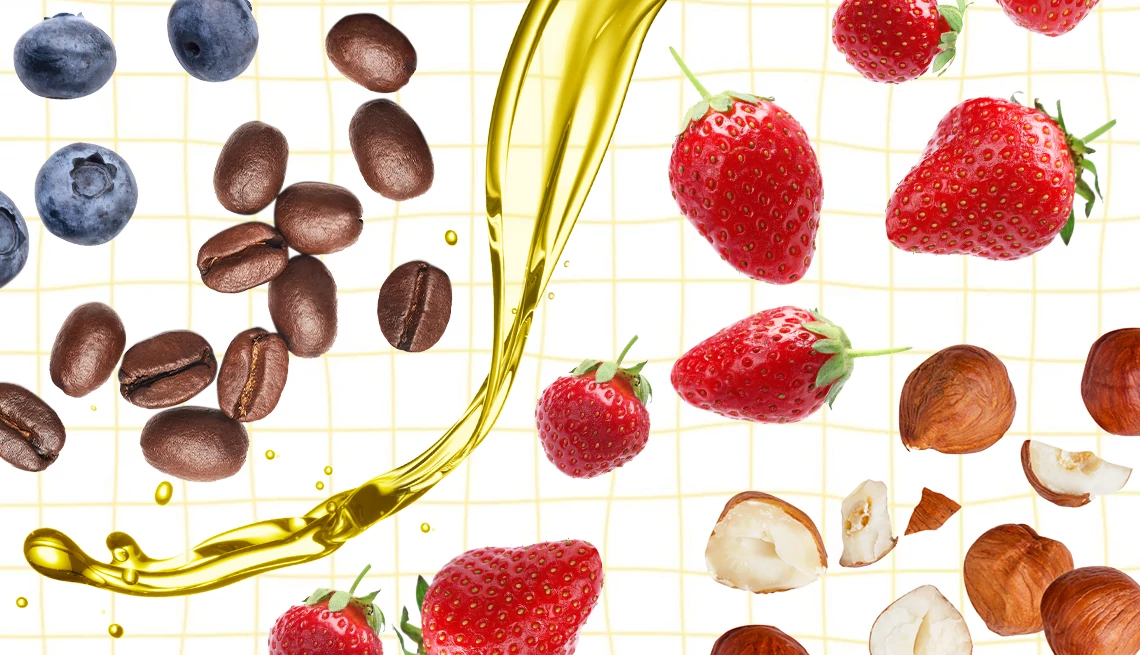AARP Hearing Center


You’ve heard of antioxidants— compounds that protect the body from unstable molecules. But there’s another key nutrient found in many plant-based foods that functions like antioxidants and is getting a lot of attention.
Researchers are taking notice and studying how they can help in the fight against chronic diseases and keep the body healthy.
Say hello to polyphenols. "There’s specific research that consumption of [polyphenols] can improve life quality, life expectancy, health in the prevention of cognitive aging and specifically Alzheimer’s disease," says Samantha Dieras, a registered dietician and director of ambulatory nutrition service at Mount Sinai Hospital.
What are polyphenols?
11 Foods and Drinks High in Polyphenols
- Blueberries 525 mg/100g
- Blackberries 248 mg/100 g
- Raspberries 225mg/100
- Strawberries 225 mg/100g
- Cranberries 120-315 mg/100g
- Coffee 200mg/ 100ml
- Green Tea 115mg/100ml
- Hazelnuts 291- 875 mg/100 g
- Pecans 1520 mg/100g
- Walnuts 1558-1625 mg/100g
- Olive oil 50-1000 mg/kg*
*Based on olive ripeness, extraction technique and storage
Polyphenols are molecules with both antioxidant and anti-inflammatory properties that are found in plants and plant-based foods.
"The plant foods make polyphenols to protect themselves from the environment," says Beth Goodridge, a registered dietitian with Kaiser Permanente in northern California. "When we eat plants that have polyphenols, it provides us with some protection, too."
You may have heard of some polyphenols, such as flavonoids and resveratrol, but there are more than 8,000 of these small molecules grouped into categories based on their chemical structures.
Why are polyphenols good for you?
"The primary superpower [of polyphenols] is they act as an antioxidant in the body," says Goodridge. Antioxidants are natural compounds that neutralize unstable molecules or free radicals and protect the body. "Free radicals disrupt the natural flow, " says Goodridge. "They cause mischief in the body," An accumulation of free radicals in the body damages cells, known as oxidative stress. Antioxidants help slow down the oxidative process and slow down aging.
Helps older adults
Polyphenols have many health benefits, especially for older adults. A 2022 review of health benefits of polyphenols in spices, published in Current Research in Food Science, notes that oxidative stress —an imbalance of antioxidants and free radicals in the body — is a major cause of many chronic diseases and aging cells. The authors said that polyphenols can help minimize cell damage due to oxidative stress.



































































More From AARP
5 Good Reasons to Eat More Fiber
What the latest health research says about this powerhouse nutrient
15 Foods High in Omega Fatty Acids
How to work this top nutrient into your diet for a longer, healthier life25 Foods That Won't Cause Weight Gain
Eat these to your heart's content